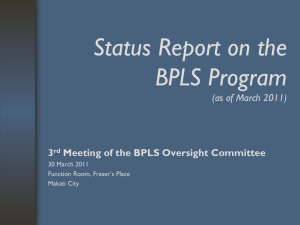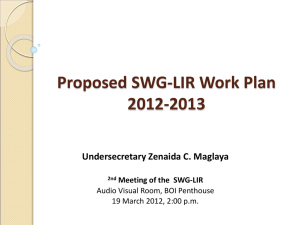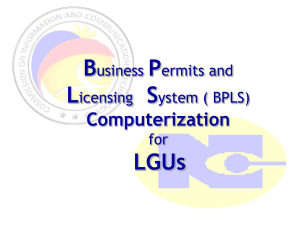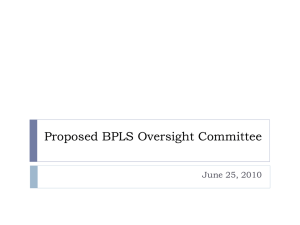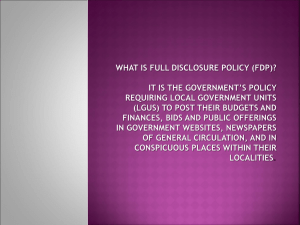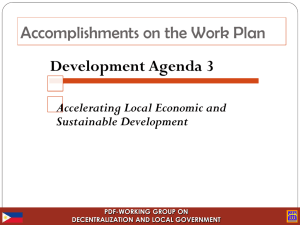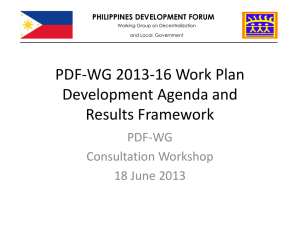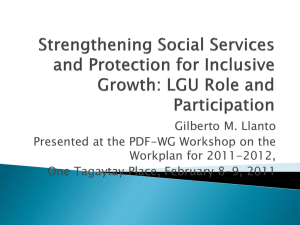The following paper outlines the discussions, conclusions and
advertisement
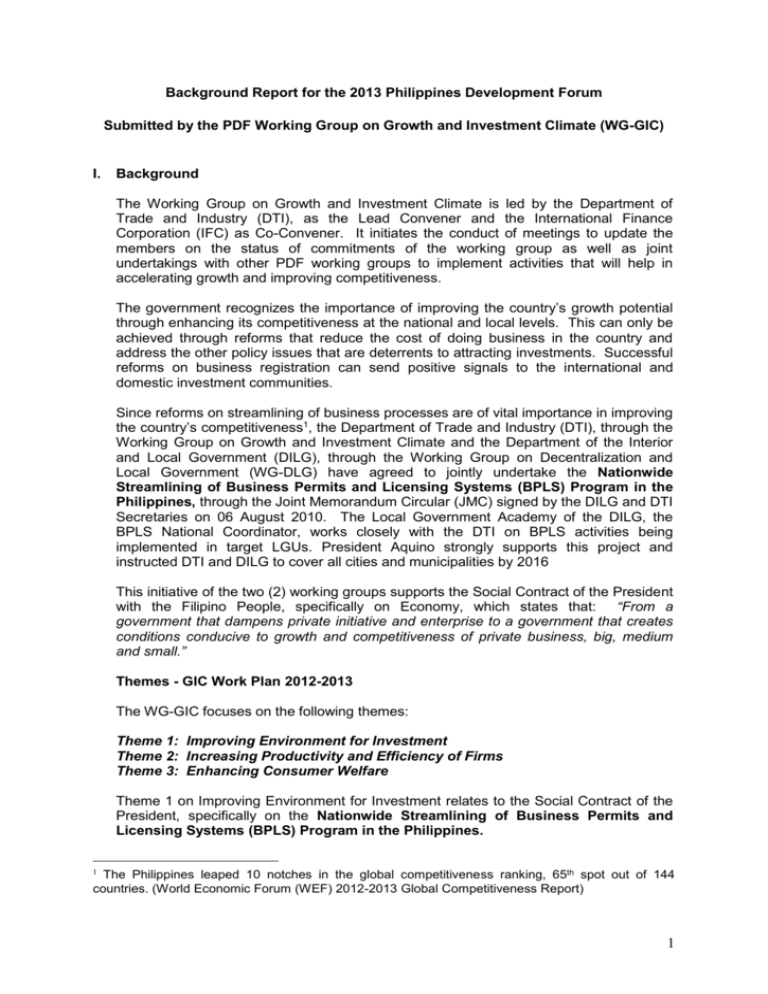
Background Report for the 2013 Philippines Development Forum Submitted by the PDF Working Group on Growth and Investment Climate (WG-GIC) I. Background The Working Group on Growth and Investment Climate is led by the Department of Trade and Industry (DTI), as the Lead Convener and the International Finance Corporation (IFC) as Co-Convener. It initiates the conduct of meetings to update the members on the status of commitments of the working group as well as joint undertakings with other PDF working groups to implement activities that will help in accelerating growth and improving competitiveness. The government recognizes the importance of improving the country’s growth potential through enhancing its competitiveness at the national and local levels. This can only be achieved through reforms that reduce the cost of doing business in the country and address the other policy issues that are deterrents to attracting investments. Successful reforms on business registration can send positive signals to the international and domestic investment communities. Since reforms on streamlining of business processes are of vital importance in improving the country’s competitiveness1, the Department of Trade and Industry (DTI), through the Working Group on Growth and Investment Climate and the Department of the Interior and Local Government (DILG), through the Working Group on Decentralization and Local Government (WG-DLG) have agreed to jointly undertake the Nationwide Streamlining of Business Permits and Licensing Systems (BPLS) Program in the Philippines, through the Joint Memorandum Circular (JMC) signed by the DILG and DTI Secretaries on 06 August 2010. The Local Government Academy of the DILG, the BPLS National Coordinator, works closely with the DTI on BPLS activities being implemented in target LGUs. President Aquino strongly supports this project and instructed DTI and DILG to cover all cities and municipalities by 2016 This initiative of the two (2) working groups supports the Social Contract of the President with the Filipino People, specifically on Economy, which states that: “From a government that dampens private initiative and enterprise to a government that creates conditions conducive to growth and competitiveness of private business, big, medium and small.” Themes - GIC Work Plan 2012-2013 The WG-GIC focuses on the following themes: Theme 1: Improving Environment for Investment Theme 2: Increasing Productivity and Efficiency of Firms Theme 3: Enhancing Consumer Welfare Theme 1 on Improving Environment for Investment relates to the Social Contract of the President, specifically on the Nationwide Streamlining of Business Permits and Licensing Systems (BPLS) Program in the Philippines. 1 The Philippines leaped 10 notches in the global competitiveness ranking, 65th spot out of 144 countries. (World Economic Forum (WEF) 2012-2013 Global Competitiveness Report) 1 The Nationwide Streamlining of BPLS Program in the Philippines aims to address the high cost of doing business in the Philippines as a constraint to the competitiveness of the country. The Program takes its legal basis from RA 9485 “An Act to Improve Efficiency in the Delivery of Government Service to the Public by Reducing Bureaucratic Red Tape Preventing Graft and Corruption and Providing Penalties Therefor” or better known as the Anti-Red Tape Act (ARTA), which was passed in 2007. In general, the objective of the BPLS Program is to streamline the business permits and licensing systems in the Philippines of as many LGUs as possible, following the BPLS standards set under JMC No. 1, Series of 2010). BPLS Standards (per JMC No.1, Series of 2010) - Unified form - Five (5) steps 1. 2. 3. 4. 5. Securing application form Filing/submission of accomplished form with documents One-time assessment of taxes, fees and charges One-time payment of taxes, fees and charges Securing Mayor’s Permit - Processing time New business permits: not more than 10 days but LGUs are enjoined to strive for 5 days or less Business renewals: - Signatories: not more than 5 days but LGUs are enjoined to strive for 1 day or less Five (5) signatories, but LGUs are enjoined to require only 2 signatories (Mayor and Treasurer or the BPLO) Target LGUs In compliance with the instruction of President Aquino during the 03 January 2012 meeting of the Good Governance and Anti-Corruption Cluster (GGAC) to increase the original 480 target LGUs under the BPLS Program, all cities and municipalities nationwide should have reformed their business permit and licensing systems by end 2016. Accomplishments 1. Processing Reengineering As of 30 September 2012, 784 LGUs have already undergone process reengineering (432 LGUs from the 480 target list; 352 LGUs are non-target). 2. Results-Based Monitoring and Evaluation (RBME) Towards the institutionalization of the enhanced M&E framework for the Nationwide BPLS Program, a two-day seminar/workshop was conducted on 24-25 May 2012 at the Goldland Millenia Suites Hotel, Pasig City. 2 The activity was undertaken to build the capacity of key program actors, particularly from the DILG and DTI field offices, to implement and mainstream results-based M&E processes and tools at the local level. 3. BPLS Automation (Component 2 of the BPLS Program) The forum on BPLS Automation entitled: MOVING FORWARD: From BPLS Streamlining to Automation: Sustaining Partnerships for BPLS Reforms was conducted on 24-25 July 2012, at the Crowne Plaza Manila Galleria, Quezon City, which aims to orient LGUs on the next wave of reforms in business processing: BPLS automation and making business-friendly inspections. The Sub-Working Group on Local Investment Reforms (SWG-LIR) As stipulated in the MOA, the SWG-LIR shall be jointly managed by the PDF Working Groups on Growth and Investment Climate (GIC) and Decentralization and Local Government (DLG) to promote reforms that would address the constraints to local investment generation. Composition • Lead Conveners: DTI and DILG • Co-Convener: • Sub-groups: BPLS Oversight Committee and others that may be formed as the need arises. • Government partners/members will depend on the activities • Secretariat support to be rotated between DTI and DILG. United States Agency for International Development (USAID) Functions • Promote investments at the local level through reforms environment for both local and foreign investments; • Identify projects that will address constraints to investments at the local level; • Seek funding support for its activities and coordinate with development partners in efforts to promote local investments, consistent with the principles of the Paris Declaration on Aid Effectiveness.; and • Coordinate with concerned government agencies and instrumentalities in the conduct of its activities, as necessary. that provide a positive Reform Areas • Streamlining local and national regulatory processes; • Addressing governance issues that affect investments; 3 • Promoting local economic strategies conducive to investment, e.g. investment promotion, organization of LGU alliances and clusters; • Improving information support through generation of data that are critical to investment generation; and • Addressing consumer-related issues. For the Summary of meetings convened and the major agenda at the meetings since the last PDF, please refer to Annexes A and A.1. For the WG-GIC Directory, please refer to Annex B. II. Major Policy Issues and Challenges Identified The WG-GIC, with the support of USAID through INVEST, conducted the following studies: Survey of Business Taxes and Fees; Investment Incentives at the Local Level under Existing National Laws; and Developing a Framework for Local Economic Development and Competitiveness Indicators. These studies were made to address the following issues and challenges: Implementation of BPLS Automation in LGUs taking into account varying stages in the implementation of reforms and capacity to implement automation; Inconsistency in interpretation of BPLS standards by LGUs; and Inconsistency of some Local Investment and Incentives Codes (LIICs) with national laws. III. Recommendations (deliverables that the WGs are ready to commit to address the remaining challenges of the Social Contract/PDP) Continue BPLS Rollout to target LGUs from 2013-2016; Prepare Guidelines on Implementation of BPLS Automation for LGUs; Review of the DILG-DTI Joint Memorandum Circular (JMC) to clarify definition of terms used in implementing BPLS standards and ensure consistency in interpretation of LGUs; Issue a Directive on a uniform template for the preparation of a Local Investment and Incentives Code (LIIC) that is consistent with national laws to guide the LGUs in the preparation of their respective LIICs (can be a joint undertaking with the Working Group on Decentralization and Local Government); and For agribusiness and tourism, identify processes and requirements for starting a business that need to be streamlined. 4
